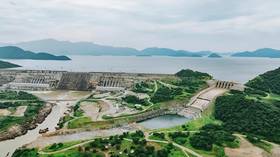African states ratify Nile River deal despite opposition

Ethiopian Prime Minister Abiy Ahmed has announced the formal implementation of a cooperative framework agreement for the management and development of water resources in the Nile Basin, despite opposition from African neighbors Egypt and Sudan.
The Cooperative Framework Agreement (CFA) establishes the Nile River Basin Commission (NRBC), a permanent body that would promote cooperation among the region’s upstream countries. Uganda, Ethiopia, Rwanda, Tanzania, Kenya, and Burundi signed the CFA, also known as the Entebbe Agreement, in 2010, with South Sudan joining in 2012. However, delays in approval by parliaments in at least six states slowed ratification. South Sudan’s parliament approved it in July. In August, Addis Ababa forwarded it to the African Union, enabling it to take effect 60 days after South Sudan’s accession.
On Sunday, Abiy hailed the CFA’s entry into force as a “historic milestone” in the collective efforts of signatory countries to “foster genuine cooperation in the Nile Basin.”
“I also call upon the non-signatory states to join the Nile family, so that together we may achieve our shared goals of development and regional integration,” the Ethiopian leader wrote on X.
Earlier on Saturday, Egypt and Sudan rejected the CFA agreement, calling it an “incomplete” document that is not “representative of the Nile Basin as a whole.”
The two countries urged all parties to refrain from unilateral actions that could exacerbate divisions between them, according to a joint statement following a meeting of the Egyptian-Sudanese Permanent Joint Technical Commission for the Nile Waters (PJTC).
“Egypt and Sudan have consistently sought to establish a consensual all-inclusive mechanism that fosters collaboration among all Nile Basin states, based on the fundamental principles … notably… thorough scientific assessments of the economic, social, and environmental impacts of such projects. Regrettably, these efforts have not been met with the necessary positive engagement,” the PJTC stated.
The Nile River has been the source of longstanding tensions, particularly between Egypt and Ethiopia. Cairo gets 97% of its water from the Blue Nile River, one of the Nile’s main tributaries, where Addis Ababa is currently building the Grand Ethiopian Renaissance Dam (GERD).
The GERD, which has been under construction since 2011, has a planned capacity of 5.15 gigawatts, which will make it the largest hydroelectric power plant in Africa once completed. While Ethiopia considers it critical to its economic development and claims it poses no threat to downstream water supplies, it has been a major point of concern for Egypt and war-torn Sudan. Both downstream states demand a binding agreement on the dam’s filling and operation.
Last month, the Egyptian government filed a complaint with the UN Security Council, accusing Ethiopia of violating international law and threatening regional stability with its alleged unilateral actions regarding the GERD project. The move came after Abiy announced the fifth phase of filling the dam.














